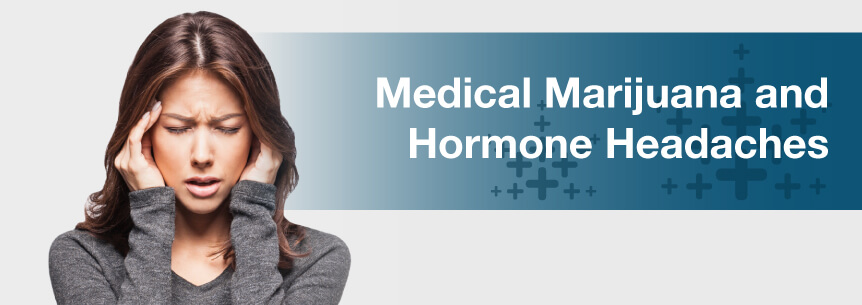
Headaches can be miserable — as we all know. And, for us women, along with the moodiness and bloating our premenstrual cycle brings on, we also can experience hormone headaches. In fact, around 50 percent of women who experience severe headaches, such as migraines, find a link between their menstrual period and headaches, according to research published in Therapeutic Advances in Neurological Disorders.
Fortunately, when you can’t find relief from traditional treatments, you may be able to add medical marijuana for hormone headaches into your treatment plan to find immediate relief.
For both women and men, various factors contribute to getting headaches, including age and family history. However, women often notice an association between hormonal changes and headaches. Changes in progesterone and estrogen levels appear to trigger hormone headaches in some people. Estrogen and serotonin seem to have a link. Serotonin is a chemical widely acknowledged to have a close relation to migraines.
When your estrogen drops during your menstrual cycle time, your serotonin level does too. Because of this, migraines seem to occur the most when high estrogen levels suddenly drop. For this reason, women often tend to get their first migraine when they’re in their adolescence. Before the teenage years, both females and males both get these types of headaches equally.
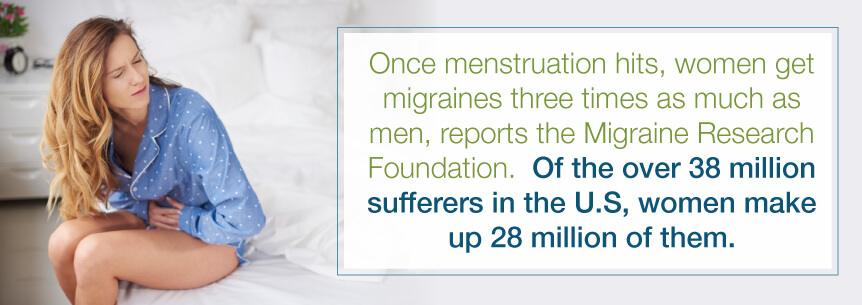
However, once menstruation hits, women get migraines three times as much as men, reports the Migraine Research Foundation. And, of the over 38 million sufferers in the United States, women make up 28 million of them. A hormonal migraine is one of the top health concerns affecting women.
Women can suffer from seven hormone headache types during various stages of their lives. These include:
A migraine headache is one of the earliest maladies known to the human race. In fact, the ancient Egyptians recorded some of the oldest incidences of headaches as far back as 1200 B.C. Later on, Hippocrates referenced the visual disturbances like blurred vision or flashing lights that come before a migraine in around 400 B.C. Today, we call these disturbances an aura. He also referenced how sufferers found relief after vomiting.
Abū Bakr Muhammad ibn Zakariyyā al-Rāzī linked migraines and hormones together as he referenced how these types of headaches occur after childbirth, during menopause or dysmenorrhea.
Having a pounding head is a hormonal headache’s main characteristic. But women also have other symptoms doctors look for to help them diagnose hormone headaches. Some of these symptoms include:
Hormone migraines are just like normal migraines and might or might not come with auras. With this headache, you experience a throbbing pain that begins on one side of your head. You may also experience nausea or vomiting and sensitivity to light. The earlier you treat a hormone headache, the better the chances you’ll get relief from your symptoms.
Some women who are suffering from a hormone headache can’t tolerate the pain, particularly those who have a low pain tolerance. Their headache can:
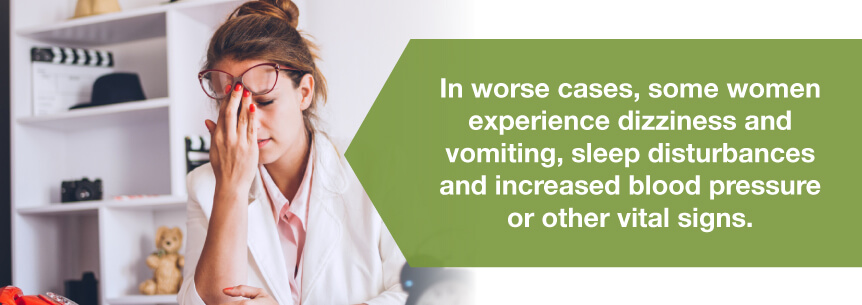
In worse cases, some women experience dizziness and vomiting, sleep disturbances and increased blood pressure or other vital signs. If sudden symptoms accompany your hormone headache, like muscle weakness, rash, shortness of breath or decrease in consciousness level, seek medical attention right away.
Individuals suffering from migraines, in general, are at a higher risk of:
Women who are experiencing frequent menstrual migraines or hormone headaches are just as likely to suffer from these complications as well.
Statistics about hormonal headaches from the Kennedy Health Alliance show:
The Association of Reproductive Health Professionals reports the following about women and migraine headaches:
Your doctor may suggest home and alternative remedies first such as:
Naproxen, ibuprofen or other nonsteroidal anti-inflammatory drugs (NSAIDs) are sometimes the only treatment options you need to get rid of a hormone headache. These are easily available at your local pharmacy or grocery store over the counter.
If needed, your physician can even prescribe you a stronger dose of NSAIDs. These medications are also good at relieving menstrual cramps. Taking these types of medications long term can be damaging to your stomach.
Side effects of NSAIDs may include:
Another medication your doctor may recommend is triptans. These medications block your brain’s pain signals. They begin working about an hour or so after taking them. With the advice of your doctor, you may combine them with an NSAID for better relief.
If you get your menstrual period each month at the same time, you can begin taking these medications several days before you begin to bleed and keep taking them for two weeks. Your physician may recommend a preventive medication to prevent a hormone headache from occurring in the first place if your menstrual period doesn’t always come each month at the same time.
Side effects of triptans may include:
If you find success with preventive medication, your physician may try hormone therapy. They may prescribe you an estrogen pill or pitch to take daily.
To balance out your hormones and minimize your hormone headaches, your doctor may suggest birth control pills. If you’re already on birth control or another type of hormonal contraceptive and are experiencing hormone headaches, your physician may change the dose you take or switch you to a lower estrogen dose medication to minimize your symptoms.
Your doctor may suggest you start your next pack of birth control pills early, meaning you’d skip the hormone-free placebo pills in your pack for the last week. If this is the case, you’ll likely do this for three to six months at a time to help minimize the frequency of your headaches.
Side effects of hormone therapy will depend on the drug used, but they may include:
With biofeedback, you reduce the pain or frequency of your hormone headaches by learning to relax certain muscles.
To help reduce the intensity of your headaches, your physician may suggest magnesium supplements. You will also benefit from reducing the stress in your life. Try getting a massage regularly.
The Neuroendocrinology Letters published a 2008 study showing migraines are strongly linked to your endocannabinoid function. According to the study, an endocannabinoid deficiency could cause migraines, and this means medical marijuana could help reduce migraines by supplementing the natural reserve of endocannabinoids you have in your body.
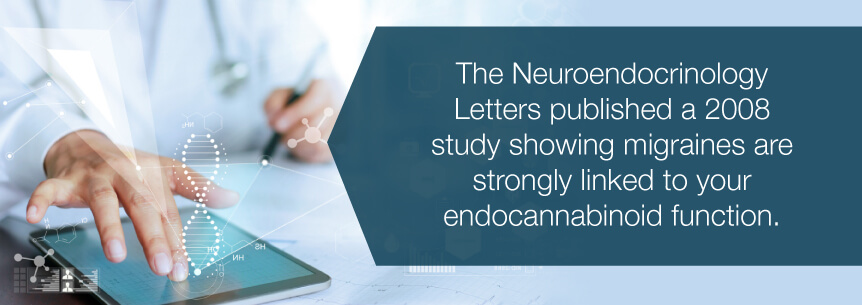
CBD in medical cannabis for hormone headaches has analgesic and anti-inflammatory properties proven to treat migraines effectively. The other compound, THC, also helps relieve the symptoms of migraine headaches because it can reduce the pain. Therefore, it is likely just as effective on hormone headaches as well.
But, strains of medical cannabis heavy in CBD can help ease your symptoms but keep you alert. THC produces euphoria where you feel “high.” Some people don’t like that feeling. In this case, CBD strains will allow them to get relief all day long without feeling stoned.
While there’s more scientific research needed, using marijuana for hormone headaches is effective and safe, and many patients are using it to help treat and prevent their headaches. In fact, many individuals even say they don’t require any prescription drugs with all those adverse side effects any longer to get relief from their headaches.
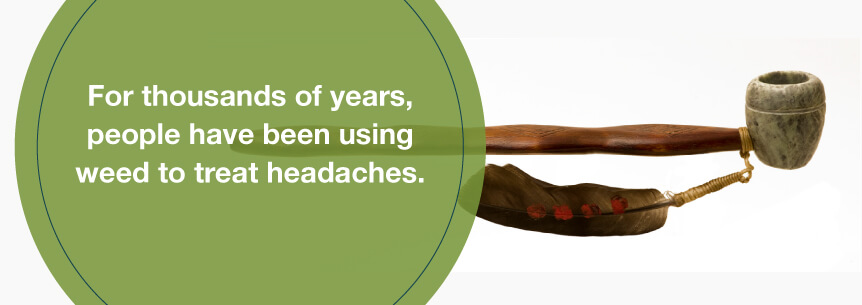
For thousands of years, people have been using weed to treat headaches. Medical marijuana patients are finding relief with medical pot from symptoms like:
They’re also reporting less severity and fewer frequencies of their headaches when using marijuana and hormone headache treatment.
Since cannabis alleviates many well-known headache trigger factors like stress, anxiety and sleep deprivation and reduces the number of attacks, patients are reporting overall better quality of life.
If you’re looking for cannabis and hormone headache treatment without feeling high, the strains below, while having some THC in them, are high in CBD, which can alleviate your headache symptoms without giving you that “stoned” feeling. Remember though, some of these do contain little amounts of THC — therefore, they may be somewhat psychoactive.
Harlequin
A sativa strain, Harlequin balances out CBD and THC, so it provides you with good hormone headache pain relief without a severe psychoactive high. It’s non-sedative but relaxing.
CannaTsu
Canna-Tsu is a hybrid strain that gives you mental clarity with calming effects. It reduces inflammation, and this is often a common cause of a migraine headache. Canna-Tsu is also known for getting rid of a migraine and headache pain.
Sour Tsunami
This is a powerful pain-relieving hybrid strain as well.
ACDC
Since it’s high in CBD, ACDC reduces inflammation effectively, making it highly effective at treating migraine and other headache symptoms. It’s a hybrid that works well for reducing depression and anxiety and doesn’t produce a psychoactive high since it is low in THC.
Cannatonic
Cannatonic has gained the reputation of being a strong hybrid strain for fighting the pain of migraines without the psychoactive effects — or very little.
Stephen Hawking Kush
Stephen Hawking Kush contains high CBD levels and is both relaxing and soothing. This indica strain helps keep the pain away and assists individuals struggling with fatigue, allowing them to stay awake pain-free.
Remedy
Remedy is a hybrid that provides you with mellow relaxation but also decreases migraine inflammation due to its high CBD content.
Hawaiian Dream
Hawaiian Dream is also effective at treating inflammation and pain without giving you the “brain fog.” It’s a hybrid strain, and it makes a great daytime treatment.
Sweet and Sour Widow
Hybrid strain Sweet and Sour Widow keeps you clear-headed all day while its anti-inflammatory properties go to work to relieve your pain and inflammation of your headache.
After the flower itself, the second most essential consideration you need to take with cannabis consumption is the delivery method. Many people often overlook this point. There are three common and basic delivery methods: oral, inhalation and topical.
According to a study, the inhalation delivery methods give you the quickest effects and have better chances of stopping your hormone headache in its tracks. Edibles take longer to give you relief and are more likely to bring on intense euphoria and sleepiness.
Chronic pain is a qualifying condition for medical marijuana in many states. So, if you have chronic hormone headaches, work with a medical marijuana doctor to see if you could be eligible for medical cannabis. Search for a cannabis dispensary or medical marijuana doctor today to get started.
Find A Doctor Find A Dispensary


Please allow us to access your location to find local dispensaries.
VIEW ALL DISPENSARIES ➔